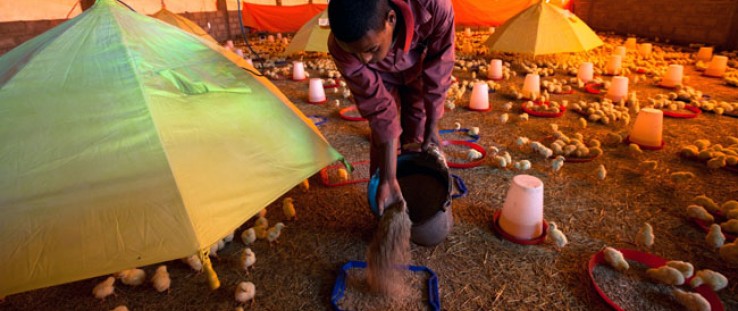 Today USAID loan-guarantee recipient Abebaw Gessese produces over 5 million eggs a year and enough chicken meat to feed 108,000 people.
Morgana Wingard
Today USAID loan-guarantee recipient Abebaw Gessese produces over 5 million eggs a year and enough chicken meat to feed 108,000 people.
Morgana Wingard
 Today USAID loan-guarantee recipient Abebaw Gessese produces over 5 million eggs a year and enough chicken meat to feed 108,000 people.
Morgana Wingard
Today USAID loan-guarantee recipient Abebaw Gessese produces over 5 million eggs a year and enough chicken meat to feed 108,000 people.
Morgana Wingard
Development Credit and Food Security
Abebaw Gessese is a poultry farm owner in the rural town of Mojo, a few hours south of Ethiopia’s capital. Poultry farming, however, wasn’t always Gessese’s profession. He majored in accounting at Addis Ababa University and spent a decade working in the Development Bank of Ethiopia before deciding to take the risk that every entrepreneur must take: giving up the security of a constant paycheck to pursue a dream.
Related Content
Learn more about USAID’s Development Credit Authority
Launch an infographic about Abebow's farm
Photo Slideshow: Abebow's Story
You could say that starting a farm was in Gessese’s blood. Both of his parents are farmers, and he grew up looking after the family’s cattle and sheep. After seeing firsthand the growing yet unmet demand for poultry in the capital, he knew starting a poultry farm could be the answer for improving his life, his two children’s future, and his community. While he was determined to push forward and successfully acquired a certificate to lease land from the Oromia regional government (in Ethiopia, the Government owns all land), Gessese lacked the financing for his poultry business.
A lack of access to credit for farmers and other small businesses is widespread in most developing countries. Yet in Ethiopia, and in many other low-income countries, a majority of the population farms or resides in rural areas. Although they are central to these countries’ economic advancement, small farms and agribusinesses often face a devastating impediment to growth: a lack of access to financing. Banks are hesitant to lend to sectors they perceive as being too risky.
In response, USAID’s Development Credit Authority has established risk-sharing agreements with local banks in developing countries around the world. The agreements state that USAID will share risk on loans made by these banks if they increase their lending to sectors that require financing and are central to local USAID priorities. Put another way, USAID will partially reimburse banks—typically 50 percent—for defaults on these loans. As a result, banks are able to boost their lending and expand into new sectors that they traditionally perceived as being too risky.
“DCA is mobilizing private financing in Ethiopia and around the world by fundamentally changing the risk-return ratio for banks. By sharing risk, we can get banks to make investments they wouldn’t normally make,” said Ben Hubbard, director of USAID’s Development Credit Authority.
In Ethiopia, USAID has established 11 guarantee agreements with five local private banks since 2004, opening up $66 million in credit to entrepreneurs like Gessese at a cost of $7 million to USAID. These entrepreneurs are not solely farmers. They range from tourism entrepreneurs to importers. The money is put aside in the U.S. Treasury in case of defaults. But of all the $32 million in DCA loans made in Ethiopia, defaults have only been 2.5 percent.
Changing Fortunes
After USAID signed a guarantee agreement with Dashen Bank, Gessese’s local financial institution, his fortunes started to change. With USAID’s guarantee and Gessese’s land certificate in hand, the Bank felt comfortable approving the loan. He was not alone. An additional 74 entrepreneurs in Ethiopia’s agriculture sector have benefited from USAID’s guarantee.
With a five-year, $132,000 loan received in 2007, Gessese was able to increase his output and start producing his own inputs, such as chicken feed, directly on the farm. Today, his farm produces over 5 million eggs and 60,000 broiler chickens annually, providing a much-needed affordable source of protein for local customers. Due to increased production at his farm, Gessese expanded the number of his employees from 20 in 2007 to 50 today.
This community benefits in other ways. Gessese explains: “One impact of my business on my community is that, before, they did not have clean water. We installed a mechanical well, and now water is free to over 200 households in the community who no longer have to walk long distances to access water. This helps them to have pure water and improve their health.” He is also now able to send his children to a better school.
By empowering local banks to lend to the agriculture sector and people like Gessese, USAID is helping countries become reliant on their own food supplies. Says USAID Ethiopia Mission Director Tom Staal: “In Ethiopia, we are working closely with the Government’s Agricultural Growth Plan through our Feed the Future Initiative to open up space for the private sector in improving technology, value chains and rural development. As countries develop local agricultural capacity, they become less dependent on food aid and foreign assistance.”







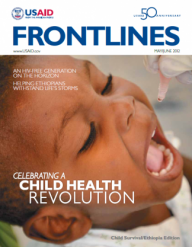

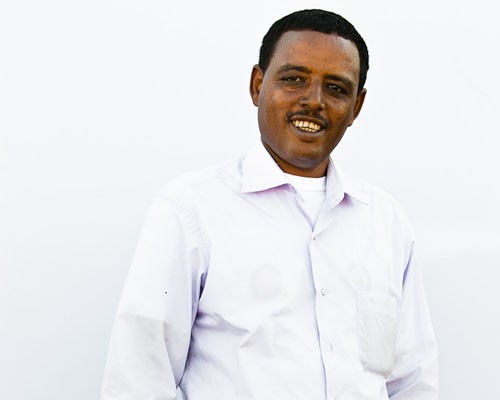
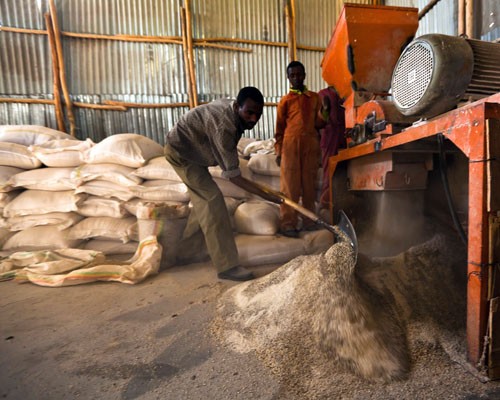
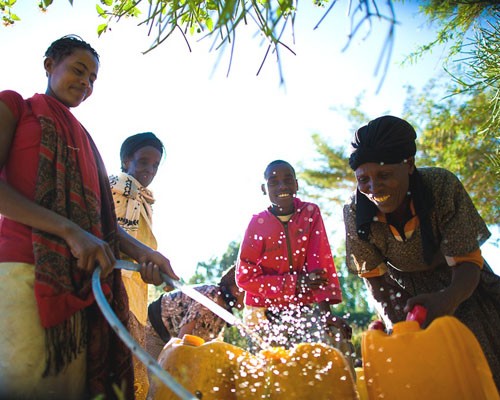
Comment
Make a general inquiry or suggest an improvement.